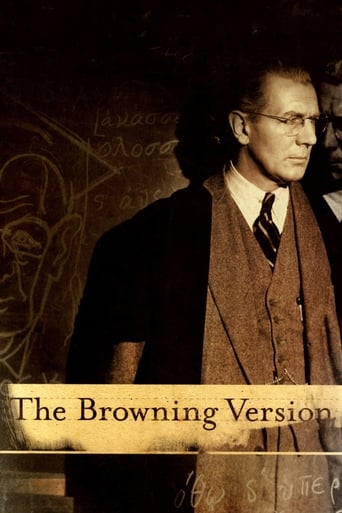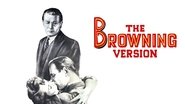TheLittleSongbird
After watching the Terence Rattigan DVD collection (with most of the adaptations being from the 70s and 80s) when staying with family friends last year, Rattigan very quickly became one of my favourite playwrights and he still is. his dialogue is so intelligent, witty and meaty, his characterisation so dynamic, complex and real and the storytelling so beautifully constructed.'The Browning Version' is a defining example of Rattigan at his finest. As said in previous reviews for the adaptations part of the Terence Rattigan DVD collection, is also at his best when laying bare deep emotional and psychological strains in his principal characters within a skillful dramatic framework. 'The Browning Version' epitomises that as well as everything that makes me love Rattigan's work so much. Was bowled over by this near-perfect 1951 film.Not only is it the definitive version of the play but to me it is also one of the best adaptations of any of Rattigan's work, film or television. The only thing that rang false was despite Crocker Harris' very powerful, lump in the throat and tear welling departure speech how it concludes so optimistically after everything that happened in the rest of the film, it just seemed so contrived.Can't say anything wrong with anything else though. The best things about it are the script and the performance of Michael Redgrave, the aspects that one remembers long after the film is over. The script benefits hugely from the involvement of Rattigan himself and from him extension, his superb writing, dynamic between the characters and consummate attention to very complex characterisation shine through wonderfully here and really keeps things afloat.Redgrave is simply mesmerising, he has never been better and his performance is nuanced, at times stern and cold but extremely moving, there is self-pity here but done with incredible dignity. He's not the only good actor. Jean Kent's heartlessness as Millie is very chilling, if she comes across as a character with no redeeming qualities or weaknesses that is the film taking the right approach with a character that is meant to be like that. Nigel Patrick is suitably cocky, while Wilfred Hyde White steals scenes and Brian Smith is a winning Taplow.Anthony Asquith's direction never allows the action to become stage bound. The gentile shabbiness of the school is captured neatly but never pat as is how all the different woes come over so mercilessly, which is what makes the drama so poignant and haunting. The story is basically an introspective character study and in terms of detail and emotional impact it's remarkably rich and subtle. There are standout moments such as the emotional turning point for Crocker Harris and the departure speech.Cinematography is beautifully done and the set and costumes are handsomely produced. Good music from Arnold Bax as well.In summation, a wonderful film and an example for any future Rattigan adaptation, especially for a play as good as 'The Browning Version'. 9/10 Bethany Cox
d_m_s
Michael Redgrave's performance is excellent in this film. I thought he played the unemotional, cuckolded husband perfectly throughout. I also enjoyed Wilfrid Hyd-White's comical performance (which is identical to his enjoyable performance in The Third Man).I like low-key films with plain, simple, un-flashy directing styles and Anthony Asquith's simple 'point & shoot' directing technique fitted the story perfectly.Other performances were not so good, often being a bit too OTT (I'm thinking mainly of the man having the affair with Redgrave's wife and some of the school boys).Overall, the film was enjoyable, though I don't feel it has any repeat-viewing value. I would have given it a higher score but the last 20 minutes or so became a bit too saccharine for me. I don't know if Terrence Rattigan wrote this from personal experience but the ending certainly felt like it was a bit of wish fulfilment and I found the excessive applause at the end of Redgrave's speech inauthentic. Also, the film was a bit too biased to be really exceptional. It was very much from the POV of Redgrave's character and very much against his wife but I do not feel we understood her character enough, since her background and reasons for her behaviour (though briefly touched upon by Redgrave late in the film) was not really explored. So it was a bit too biased in trying to make us sympathetic to Redgrave, which made it slightly less enjoyable for me.
pontifikator
The Browning VersionThis is a quietly good British movie from the early 50s. It stars Michael Redgrave as a pompous and disliked professor of Latin and Greek, Andrew Crocker-Harris; Jean Kent plays his wife, Millie, and Nigel Patrick plays his fellow teacher Frank Hunter - who is Millie's lover.It's a bit of a "stiff upper lip" drama. Crocker-Harris has a health problem at the age of 43 and must retire from his position. The board refuses to give him a pension, and he has to take a low-paying position at another school which will not support his wife and him. The Crock, as the students call him, is thoroughly disliked by his pupils and apparently also by the board. He soldiers on without kicking up a fuss, even when the headmaster asks him to speak before another teacher instead of last as his longer tenure entitles him. Crocker-Harris accepts degradation after degradation as his last days at the school turn to ashes.It's clear from conversations that Crocker-Harris was once considered brilliant and that he should have had a bright future ahead of him. Instead he has become a dried up shell of a human being, pedantic, boring, and known for his epigrams in Latin. His students refer to him as Himmler. (For those who have forgotten their history, Himmler was very well known as the head of the Nazi Gestapo, overseeing the internal security forces and the concentration camps where six million humans were slaughtered.) The director (Anthony Asquith) contrasts the classrooms of The Crock (quiet, labored) and Hunter (noisy, much laughter) to show us Crocker-Harris killing the souls of his pupils in his effort to instill an appreciation of Latin and Greek.How Crocker-Harris became this way is slowly wormed out of the script in a few surprising twists of plot. I hesitate to recommend the movie, as its pace and precise portrait of Crocker- Harris may put some people off. But the actors and the script are remarkably good. We see a portrait of a failure, we learn how he became as he is, and we finally see some hope for redemption.SPOILERS-------------------------- seriously - serious spoiler here if you haven't seen the movie.What makes the story rise above the ordinary is that Hunter and Crocker-Harris become friends and Crocker-Harris gives himself a chance to recover his lost brilliance. Hunter and Millie are lovers, but Hunter sees her abusive treatment of Crocker-Harris and dumps her on the spot - a surprising turn of events given his lack of decency so far. Hunter turns to Crocker-Harris as a friend, rejected at first, then accepted with a confession from Crocker- Harris concerning the failure of his marriage. We end up going from a bitter ending with Crocker-Harris as a total failure in his life, his work, and his marriage to an ending with the potential for him to recover his life and his work, but ending his marriage with dignity.Redgrave's performance as Crocker-Harris is very British and always on point; never a parody nor condescending - Crocker-Harris is a very precise man, and Redgrave nails the role. The confession Crocker-Harris makes to Hunter is that there are two kinds of love, and he could give Millie only one, when she wanted the other. My assumption is that "the other" is what she was getting from Hunter - a sexual relationship. The one Crocker-Harris offered is not spelled out. Watching the film without any knowledge of it, I assumed Crocker-Harris was impotent and offered only a platonic love.The movie is based on a one act play by Terrence Rattigan. According to the IMDb, Rattigan was a closeted homosexual born in England in 1911. He grew up in a land where homosexuality was a crime. Rattigan did the script for the movie, and the suggestion is that the love Crocker-Harris referred to was gay love, but the script is vague. There is nothing gay about Crocker-Harris, but one would not expect a gay man to be openly gay in his situation.*Whether Crocker-Harris is straight or gay, the lack of sexual satisfaction leaves Millie bitter and angry. We see her abuse him mercilessly, taking away any small pleasures he may have had. We see ultimately why Crocker-Harris became the dried up shell he is, sucking dry the souls of others without even knowing it. His entire life and career manifest the bitterness of his wife toward him. Hunter helps Crocker-Harris see the situation and make the decision to end his marriage and pick up his life and work again. It's a bitter ending with some hope; maybe enough to be bittersweet; maybe not. It's an adult work without the Hollywood ending - just like life.*Michael Redgrave, according to Wikipedia was married to the same woman for 50 years but was a bi-sexual with a long term affair with another man. It's an interesting position for Redgrave to be in.
edwagreen
Michael Redgrave is absolutely phenomenal here. He gives a subtly powerful performance as a schoolmaster, forced to go to another school, where his workload will be lighter. He needs to do this as he has developed a serious heart condition.Redgrave is absolutely mesmerizing as the no nonsense teacher, utterly despised by his pupils for his cruelty and lack of human understanding and compassion for his charges.The man is literally obsessed with Greek translations and syntax. This is all he conveys to his pupils in his narrow-minded world. His contempt for everything and everyone is vividly depicted here in a totally memorable performance. He is equally matched by Jean Kent, who portrays his unfaithful wife.He too at the end realizes his shortcomings as depicted by his farewell speech in the assembly.




